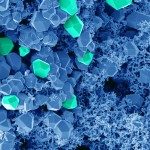The Departement of Structural Biology and Chemsitry offers a PhD position in structural biology in the frame of the VIBRANT Marie Skłodowska-Curie Innovative Training Network (ITN).
An integrative strategy for structure determination of bacterial type IV pili
To interact with their environment, bacteria have acquired a number of proteinaceous appendages that decorate their surface. These appendages, such as pili, secretion systems or flagella, are large macromolecular assemblies that participate in adhesion, cell-cell interactions, auto-aggregation, DNA exchange, motility and virulence factor transport. Type IV pili (T4P) are a class of fimbrial adhesins present in numerous pathogenic bacteria and are crucial for host colonization and virulence of many Gram-negative bacteria. T4P assembly system is very closely related to type II protein secretion systems (T2S) that are involved in the transport of folded proteins from the periplasm across the outer membrane. The common architecture of T4P and T2S is based on the assembly of helical fibers in the plasma membrane with membrane protein subunits called pilins. Other proteins called minor pilins are crucial for the initiation of this assembly. However, their molecular complexity, their dynamics, and membrane localization seriously hamper structural characterization of these fibers at atomic resolution with traditional methods (X-ray crystallography, NMR, and EM). It has become clear that a combination of structural information from many sources is the key to success.
In this project, we will implement an integrative strategy to determine the structure of a T4P, improving upon our work on T2S (see Campos et al., PNAS 107, 13081-13086 (2010); Campos et al., J Struct Biol. 173, 436-444 (2011); Campos et al., Structure 22, 685-696 (2014). First, the high-resolution structure of the soluble domain of the major pilin will be determined by NMR. In a second stage, helical parameters of pili will be obtained by EM and this data will be then combined with the pilin structure and co-evolutionary data to construct a model of the assembled pilus using a flexible molecular modeling approach. Finally, to better understand the fiber assembly mechanism, molecular interactions between major and minor pilins will be characterized by NMR and other biophysical techniques (Microcalorimetry, SPR and fluorescence). The project involves secondments with other network partners for labeled protein production (Tubingen University), training in cryo-EM data analysis (University of Helsinki) and at the Centre for Nanotechnology and smart materials (CeNTI) in Portugal to design antiadhesive surfaces.
Details and application form
Eligibility Criteria and Definitions
Benefits and salary
The MSCA-ITN programme offers a highly competitive and attractive salary and working conditions. The successful candidates will receive a salary in accordance with the MSCA regulations for early stage researchers. Exact salary will be confirmed upon offer and will be based on a Living Allowance of €3110/month to be paid in the currency of the country where based and with a correction factor to be applied per country and mobility allowance of €600/month. Additionally, researchers may also qualify for a family allowance of €500/month depending on the family situation. Taxation and Social Contribution deductions based on National and Institutional regulations will apply and will be deducted from the gross payment highlighted above. In addition to their individual scientific projects, all fellows will benefit from further continuing education, which includes the opportunity to register for a PhD degree, scientific skills courses, transferable skills courses, active participation in workshops and conferences, and secondments to partner labs.
Applicants need to fully comply with the three eligibility criteria:
- Early-stage researchers (ESR) are those who are, at the time of recruitment by the host, in the first four years (full-time equivalent) of their research careers. This is measured from the date when they obtained the degree which formally entitles them to embark on a doctorate, either in the country in which the degree was obtained or in the country in which the research training is provided, irrespective of whether or not a doctorate was envisaged. Please note applicants cannot already hold a PhD. Qualifications required for entry into the PhD program in each partner country can be found on each partner’s website or by contacting the partner by email (see links in the project descriptions section).
- Conditions of international mobility of researchers: Researchers are required to undertake trans-national mobility (i.e. move from one country to another) when taking up the appointment. At the time of appointment by the host organisation, researchers must not have resided or carried out their main activity (work, studies, etc.) in the country of their host organisation for more than 12 months in the three years immediately prior to their recruitment. Short stays, such as holidays, are not taken into account.
- English language: Network fellows (ESRs) must demonstrate that their ability to understand and express themselves in both written and spoken English is sufficiently high for them to derive the full benefit from the network training. Non-native English speakers are required to provide evidence of English language competency before the appointment is made.
Applications, filled in using the online system, should include:
- a 1 page summary of a previous research project
- copies of certificates where appropriate.
- two letters of recommendation, using the ViBrANT template, should be sent independently by your referees.
In case of difficulties with the online application system, please use the contact form.
Deadline for application: 4 January 2018
For more details on the topics and how to apply, please visit:

